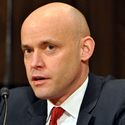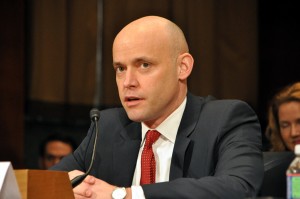National
BREAKING: Senate confirms first out gay male to federal bench
Oetken approved by vote of 80-13

The U.S. Senate made history on Monday by confirming for the first time ever an openly gay male to serve as a federal judge.
By a vote of 80-13, the Senate confirmed J. Paul Oetken, whom President Obama nominated in January to sit on the U.S. District Court for the Southern District of New York. A simple majority was required to confirm Oetken.
Joe Solmonese, president of the Human Rights Campaign, praised the Senate for what he said was a “historic vote” in confirming an openly gay male to the federal bench.
“Confirmation of Paul Oetken serves as a role model for all LGBT people interested in serving on the judiciary and shows LGBT youth that hard work pays off,” Solmonese said.
Shin Inouye, a White House spokesperson, also commended the Senate for confirming Obama’s nomination in a statement, although he made no mention of the nominee’s sexual orientation.
“The president welcomes the confirmation of Mr. Oetken and is confident that he will serve the American people with distinction from the district court bench,” Inouye said.
Denis Dison, spokesperson for the Gay & Lesbian Victory Fund, said the LGBT community still has “a lot of ‘firsts’ to achieve” and the Oetken confirmation is “great news.” The Victory Fund has been advocating for LGBT appointments in the Obama administration through its Presidential Appointments Project.
“It wasn’t even two decades ago that openly LGBT people had a hard time even being considered for a presidential appointment, and some who got nominated faced fierce opposition in the Senate,” Dison said. “Today, more than 200 LGBT Americans have been appointed by President Obama, and more than 25 of those were nominated for Senate-confirmable positions.”
No Democrat voted against the Oetken nomination. The Republican votes against the nomination were Sens. Roy Blunt (R-Mo.), John Boozman (R-Ark.), Thad Cochran (R-Miss.), Mike Crapo (R-Idaho), Jim DeMint (R-S.C.), Orrin Hatch (R-Utah), Kay Bailey Hutchison (R-Texas), Mike Lee (R-Utah), Jerry Moran (R-Ky.) James Risch (R-Idaho), Pat Roberts (R-Kansas) and Roger Wicker (R-Miss.) as well as Senate Minority Leader Mitch McConnell (R-Ky.).
Senators who didn’t vote on the nomination were Sens. Kay Hagan (D-N.C.), James Inhofe (R-Okla.), Lisa Murkowski (R-Alaska), Rand Paul (R-Ky.), Marco Rubio (R-Fla.), Pat Toomey (R-Pa.) and David Vitter (R-La.).
Oetken is first openly gay male to be confirmed to the federal bench, but not the first openly LGBT person. U.S. District Judge Deborah Batts, an out lesbian who currently sits on the U.S. District Court for the Southern District of New York, is considered the first openly LGBT person to sit on a federal court. She was appointed during the Clinton Administration.
U.S. District Judge Vaughn Walker, who ruled against California’s ban on same-sex marriage Proposition 8 last year, has also come out as gay. However, he only told reporters about his sexual orientation after he retired from the bench.
With only two openly gay people confirmed by the Senate to the federal bench, Solmonese said greater representation of LGBT people is still needed on the judiciary.
“The federal bench is greatly lacking LGBT diversity and with thousands of qualified LGBT attorneys in the [United States], there is no reason why the federal bench should not better reflect the composition of our country,” Solmonese said.
The Senate confirmed Oetken to the position after 30 minutes of debate in which senators from both sides of the aisle praised Oetken and encouraged senators to vote for his nomination.
Sen. Chuck Schumer (D-N.Y.), who recommended the nomination to Obama, praised Oetken on the Senate floor for his excellence in legal work and the moderation of his views, but also made special note of his sexual orientation.
“As the first openly gay man to be confirmed as a federal judge and to serve on the federal bench, he will be a symbol of how much we have achieved as a country in just the last few decades,” Schumer said. “And importantly, he will give hope to many talented young lawyers who, until now, thought their paths might be limited because of their sexual orientation. When Paul becomes Judge Oetken, he will be living proof to all those young lawyers that it really does get better.”
Sen. Patrick Leahy (D-Vt.), chair of the Senate Judiciary Committee, which approved Oetken unanimously by voice vote in April, also extolled how the confirmation of Oetken and said people should be proud of President Obama “for taking this critical step to break down another barrier and increase diversity in the federal judiciary.”
“All of us in the Senate can also be proud that Mr. Oetken was reported with the support of every member of the Judiciary Committee — Democratic and Republican — and will be confirmed by what I believe will be an overwhelming vote in the Senate,” Leahy said. “It is a sign that, as a nation, we have taken a new and welcome step on the path of ensuring that our Federal judiciary better reflects all Americans.”
Sen. Charles Grassley (R-Iowa), ranking Republican of the Senate Judiciary Committee, also spoke favorably of Oetken on the Senate floor — calling the nominee “qualified” and noting the nominee hails from his home state of Iowa — while encouraging other senators to vote for the nomination. However, Grassley didn’t mention Oetken’s sexual orientation on the floor of the Senate.
“I support this nomination and congratulate him on his professional accomplishments,” Grassley said.
Oetken has practiced law at Debevoise and Plimpton, and since 2004, served as associate general counsel at Cablevision. From 1999 to 2001, Oetken was associate counsel to President Clinton and specialized in First Amendment issues, presidential appointments, ethics, civil rights, and legal policy.
Additionally, Oetken served in various capacities as an LGBT advocate. The nominee has been involved with Lambda Legal and the American Civil Liberties Union. Oetken also co-authored a U.S. Supreme Court friend-of-the-court brief in Lawrence v. Texas, which struck down sodomy laws throughout the country.
Oetken isn’t the only openly gay judicial nominee that the Senate has advanced closer to a position on the federal bench. Last week, the Senate Judiciary Committee approved by a vote of 14-4 the nomination of Alison Nathan, an out lesbian whom Obama also selected to serve on the U.S. District Court for the Southern District of New York.
Another openly gay judicial nominee, Edward DuMont, has been nominated for a position on the U.S. Court of Appeals for the Federal Circuit. The Senate Judiciary Committee has yet to take up his nomination.
UPDATE: In a statement provided to the Washington Blade, Hagan, one of the senators who didn’t vote on the Oetken nomination, praised the Senate confirmation of the appointee.
“I applaud the overwhelming bipartisan support for the nomination of Paul Oetken to the U.S. District Court for the Southern District of New York,” Hagan said. “A great day for the LGBT community and the nation.”
Sadie Weiner, a Hagan spokesperson, said the North Carolina Democrat didn’t vote on the Oetken nomination because the senator was delayed while traveling by aircraft.
“On Monday, Senator Hagan was in Charlotte to speak to a camp for high-school aged young women interested in pursuing studies and careers in high technology industries,” Weiner said. “Her scheduled flight from Charlotte back to Washington was delayed several times causing her to miss the Senate vote on Judge Oetken’s nomination.”
The White House
Four states to ignore new Title IX rules protecting transgender students
Biden administration last Friday released final regulations

BY ERIN REED | Last Friday, the Biden administration released its final Title IX rules, which include protections for LGBTQ students by clarifying that Title IX forbids discrimination based on sexual orientation and gender identity.
The rule change could have a significant impact as it would supersede bathroom bans and other discriminatory policies that have become increasingly common in Republican states within the U.S.
As of Thursday morning, however, officials in at least four states — Oklahoma, Louisiana, Florida, and South Carolina — have directed schools to ignore the regulations, potentially setting up a federal showdown that may ultimately end up in a protracted court battle in the lead-up to the 2024 elections.
Louisiana State Superintendent of Education Cade Brumley was the first to respond, decrying the fact that the new Title IX regulations could block teachers and other students from exercising what has been dubbed by some a “right to bully” transgender students by using their old names and pronouns intentionally.
Asserting that Title IX law does not protect trans and queer students, Brumley states that schools “should not alter policies or procedures at this time.” Critically, several courts have ruled that trans and queer students are protected by Title IX, including the 4th U.S. Circuit Court of Appeals in a recent case in West Virginia.
In South Carolina, Schools Supt. Ellen Weaver wrote in a letter that providing protections for trans and LGBTQ students under Title IX “would rescind 50 years of progress and equality of opportunity by putting girls and women at a disadvantage in the educational arena,” apparently leaving trans kids out of her definition of those who deserve progress and equality of opportunity.
She then directed schools to ignore the new directive while waiting for court challenges. While South Carolina does not have a bathroom ban or statewide “Don’t Say Gay or Trans” law, such bills continue to be proposed in the state.
Responding to the South Carolina letter, Chase Glenn of Alliance For Full Acceptance stated, “While Supt. Weaver may not personally support the rights of LGBTQ+ students, she has the responsibility as the top school leader in our state to ensure that all students have equal rights and protections, and a safe place to learn and be themselves. The flagrant disregard shown for the Title IX rule tells me that our superintendent unfortunately does not have the best interests of all students in mind.”
Florida Education Commissioner Manny Diaz also joined in instructing schools not to implement Title IX regulations. In a letter issued to area schools, Diaz stated that the new Title IX regulations were tantamount to “gaslighting the country into believing that biological sex no longer has any meaning.”
Governor Ron DeSantis approved of the letter and stated that Florida “will not comply.” Florida has notably been the site of some of the most viciously anti-queer and anti-trans legislation in recent history, including a “Don’t Say Gay or Trans” law that was used to force a trans female teacher to go by “Mr.”
State Education Supt. Ryan Walters of Oklahoma was the latest to echo similar sentiments. Walters has recently appointed the right-wing media figure Chaya Raichik of Libs of TikTok to an advisory role “to improve school safety,” and notably, Raichik has posed proudly with papers accusing her of instigating bomb threats with her incendiary posts about LGBTQ people in classrooms.
The Title IX policies have been universally applauded by large LGBTQ rights organizations in the U.S. Lambda Legal, a key figure in fighting anti-LGBTQ legislation nationwide, said that the regulations “clearly cover LGBTQ+ students, as well as survivors and pregnant and parenting students across race and gender identity.” The Human Rights Campaign also praised the rule, stating, “rule will be life-changing for so many LGBTQ+ youth and help ensure LGBTQ+ students can receive the same educational experience as their peers: Going to dances, safely using the restroom, and writing stories that tell the truth about their own lives.”
The rule is slated to go into effect Aug. 1, pending any legal challenges.
****************************************************************************

Erin Reed is a transgender woman (she/her pronouns) and researcher who tracks anti-LGBTQ+ legislation around the world and helps people become better advocates for their queer family, friends, colleagues, and community. Reed also is a social media consultant and public speaker.
******************************************************************************************
The preceding article was first published at Erin In The Morning and is republished with permission.
Pennsylvania
Malcolm Kenyatta could become the first LGBTQ statewide elected official in Pa.
State lawmaker a prominent Biden-Harris 2024 reelection campaign surrogate

Following his win in the Democratic primary contest on Wednesday, Pennsylvania state Rep. Malcolm Kenyatta, who is running for auditor general, is positioned to potentially become the first openly LGBTQ elected official serving the commonwealth.
In a statement celebrating his victory, LGBTQ+ Victory Fund President Annise Parker said, “Pennsylvanians trust Malcolm Kenyatta to be their watchdog as auditor general because that’s exactly what he’s been as a legislator.”
“LGBTQ+ Victory Fund is all in for Malcolm, because we know he has the experience to win this race and carry on his fight for students, seniors and workers as Pennsylvania’s auditor general,” she said.
Parker added, “LGBTQ+ Americans are severely underrepresented in public office and the numbers are even worse for Black LGBTQ+ representation. I look forward to doing everything I can to mobilize LGBTQ+ Pennsylvanians and our allies to get out and vote for Malcolm this November so we can make history.”
In April 2023, Kenyatta was appointed by the White House to serve as director of the Presidential Advisory Commission on Advancing Educational Equity, Excellence and Economic Opportunity for Black Americans.
He has been an active surrogate in the Biden-Harris 2024 reelection campaign.
The White House
White House debuts action plan targeting pollutants in drinking water
Same-sex couples face higher risk from environmental hazards

Headlining an Earth Day event in Northern Virginia’s Prince William Forest on Monday, President Joe Biden announced the disbursement of $7 billion in new grants for solar projects and warned of his Republican opponent’s plans to roll back the progress his administration has made toward addressing the harms of climate change.
The administration has led more than 500 programs geared toward communities most impacted by health and safety hazards like pollution and extreme weather events.
In a statement to the Washington Blade on Wednesday, Brenda Mallory, chair of the White House Council on Environmental Quality, said, “President Biden is leading the most ambitious climate, conservation, and environmental justice agenda in history — and that means working toward a future where all people can breathe clean air, drink clean water, and live in a healthy community.”
“This Earth Week, the Biden-Harris Administration announced $7 billion in solar energy projects for over 900,000 households in disadvantaged communities while creating hundreds of thousands of clean energy jobs, which are being made more accessible by the American Climate Corps,” she said. “President Biden is delivering on his promise to help protect all communities from the impacts of climate change — including the LGBTQI+ community — and that we leave no community behind as we build an equitable and inclusive clean energy economy for all.”
Recent milestones in the administration’s climate policies include the U.S. Environmental Protection Agency’s issuance on April 10 of legally enforceable standard for detecting and treating drinking water contaminated with polyfluoroalkyl substances.
“This rule sets health safeguards and will require public water systems to monitor and reduce the levels of PFAS in our nation’s drinking water, and notify the public of any exceedances of those levels,” according to a White House fact sheet. “The rule sets drinking water limits for five individual PFAS, including the most frequently found PFOA and PFOS.”
The move is expected to protect 100 million Americans from exposure to the “forever chemicals,” which have been linked to severe health problems including cancers, liver and heart damage, and developmental impacts in children.
An interactive dashboard from the United States Geological Survey shows the concentrations of polyfluoroalkyl substances in tapwater are highest in urban areas with dense populations, including cities like New York and Los Angeles.
During Biden’s tenure, the federal government has launched more than 500 programs that are geared toward investing in the communities most impacted by climate change, whether the harms may arise from chemical pollutants, extreme weather events, or other causes.
New research by the Williams Institute at the UCLA School of Law found that because LGBTQ Americans are likelier to live in coastal areas and densely populated cities, households with same-sex couples are likelier to experience the adverse effects of climate change.
The report notes that previous research, including a study that used “national Census data on same-sex households by census tract combined with data on hazardous air pollutants (HAPs) from the National Air Toxics Assessment” to model “the relationship between same-sex households and risk of cancer and respiratory illness” found “that higher prevalence of same-sex households is associated with higher risks for these diseases.”
“Climate change action plans at federal, state, and local levels, including disaster preparedness, response, and recovery plans, must be inclusive and address the specific needs and vulnerabilities facing LGBT people,” the Williams Institute wrote.
With respect to polyfluoroalkyl substances, the EPA’s adoption of new standards follows other federal actions undertaken during the Biden-Harris administration to protect firefighters and healthcare workers, test for and clean up pollution, and phase out or reduce use of the chemicals in fire suppressants, food packaging, and federal procurement.
-

 State Department4 days ago
State Department4 days agoState Department releases annual human rights report
-

 District of Columbia3 days ago
District of Columbia3 days agoCatching up with the asexuals and aromantics of D.C.
-

 South America2 days ago
South America2 days agoArgentina government dismisses transgender public sector employees
-

 Maine4 days ago
Maine4 days agoMaine governor signs transgender, abortion sanctuary bill into law













